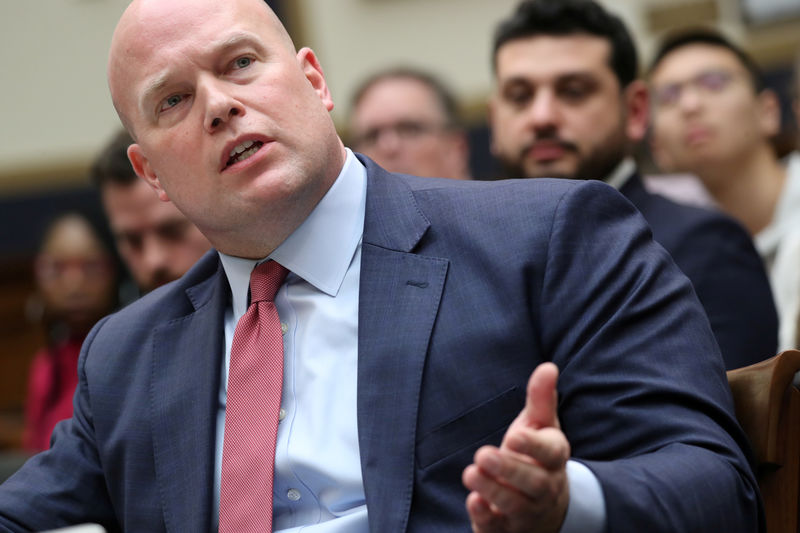By David Morgan
WASHINGTON (Reuters) - A leading House Democrat said on Tuesday that President Donald Trump appears to have influenced former acting U.S. Attorney General Matthew Whitaker to raise doubts about the campaign finance case against Trump's former lawyer.
U.S. House of Representatives Judiciary Committee Chairman Jerrold Nadler said Whitaker described interactions with Justice Department staff about the case against former Trump lawyer Michael Cohen, which involved hush money payments to women who claimed to have affairs with Trump, during a March 13 closed-door meeting with lawmakers on Capitol Hill.
In a letter on Tuesday to Assistant Assistant Attorney General Steven Engel, Nadler said Whitaker expressed to staff concerns that campaign finance charges against Cohen may have been "specious" and raised "serious questions" about the theory of the case overseen by federal prosecutors in New York.
Whitaker also had concerns about U.S. Attorney Geoffrey Berman's recusal from the case, saying the terms of the recusal were "convoluted," according to the letter.
"It is reasonable to believe that this activity - the questions Mr Whitaker asked about Mr Cohen's case, and the manner in which he asked them - reflected fears about the case that were likely expressed to Mr Whitaker by the president himself," Nadler said.
Whitaker appeared never to have taken official action to intervene in the Cohen case, Nadler said.
Officials at the Justice Department and White House were not immediately available for comment.
Cohen pleaded guilty in August to orchestrating the hush money payments, which he said Trump directed him to make.
Nadler's committee, which has jurisdiction over impeachment issues, is trying to determine whether the president has sought to obstruct justice by influencing investigations that involve him.
Trump may have urged Whitaker to Berman in charge of the Cohen case, according to a New York Times report that Trump has denied. Berman, a Trump campaign donor and former law partner of Trump attorney Rudy Giuliani, is recused from the case.
Nadler said his committee has identified individuals who claim to have direct knowledge of conversations between Whitaker and Trump.
But during their meeting on Capitol Hill, Nadler said Whitaker refused to answer questions about any conversations he may have had with Trump "on the basis that the president may one day want to invoke executive privilege."
Whitaker, who left the Justice Department after Attorney General William Barr's arrival last month, was appointed acting attorney general without Senate confirmation in November after Trump ousted former Attorney Jeff Sessions.
Democrats feared he could interfere with U.S. Special Counsel Robert Mueller's investigation into Russian meddling in the 2016 presidential election and possible collusion with the Trump campaign. Nadler said he accepts that Whitaker never gave the White House "any promises or commitments concerning the Special Counsel's investigation."

Nadler rejected Whitaker's decision not to answer questions because of possible executive privilege. He asked Engel, who heads the Justice Department's Office of Legal Counsel, to determine whether the White House would actually invoke executive privilege.